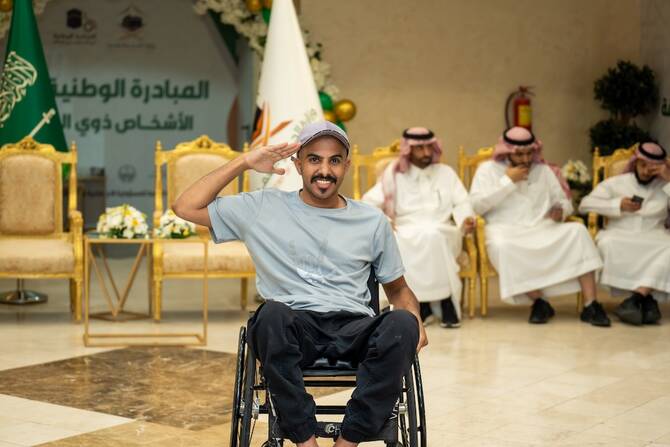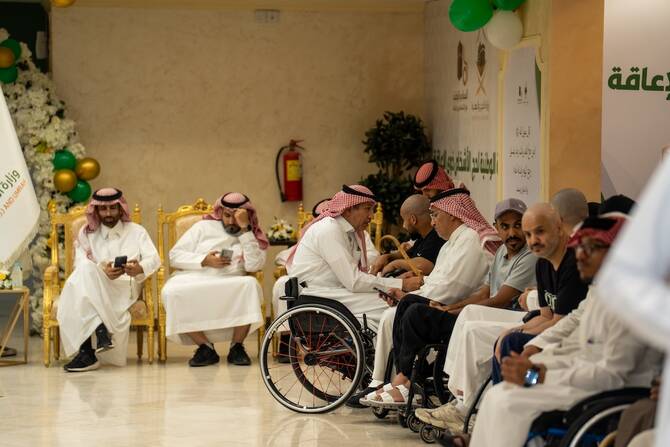



MINA: Some 524 pilgrims with disabilities arrived earlier at the holy sites, embarking on their spiritual journey as part of a pioneering national initiative led by the Ministry of Hajj and Umrah, now in its fifth consecutive year.
The National Hajj Initiative for Persons with Disabilities was designed to ensure that pilgrims with disabilities can perform Hajj with dignity and ease. It provides a suite of tailored services, including accessible transportation, specialized accommodation and 24-hour escort support for those in need.
The initiative aligns with the Kingdom’s Vision 2030 reform plan, which prioritizes inclusivity and a higher quality of life for all citizens and residents. By expanding access and strengthening support for pilgrims with disabilities, the Kingdom is reaffirming its commitment to equitable participation in all aspects of life.
According to the General Authority for Statistics’ Disability Statistics Publication 2023, released in May 2024 and carried by the Saudi Press Agency, an estimated 1.8 percent of Saudi Arabia’s population lives with some form of disability. These include a range of physical, sensory and communication impairments of varying levels of severity.
Speaking to Arab News, Abdullah Abdulmohsin Al-Harbi, head of the social responsibility and volunteering department at the Ministry of Hajj and Umrah, said that the initiative now encompassed all 13 regions of the Kingdom.
“The initiative was originally conceived to empower persons with disabilities to visit all the holy sites and perform the Hajj pilgrimage with ease and dignity,” he said.
He said that the program welcomed men and women with disabilities from across the Kingdom, selected on defined criteria and classifications.
“We are proud to host pilgrims with various types of disabilities, including those who are visually impaired, have physical disabilities, or amputations. We have mobilized all necessary resources to support them, including a streamlined travel itinerary developed in collaboration with key entities such as Public Security, the Ministry of Health, and the Ministry of Human Resources and Social Development,” he added.
Al-Harbi said that the initiative had matured over the past five years, identifying the full spectrum of needs among persons with disabilities and developing appropriate support mechanisms, including comprehensive access solutions.
He added that the ministry hoped that the program could serve as a model for all services offered to pilgrims with disabilities.
Al-Harbi also emphasized the initiative’s profound impact on pilgrims, particularly the opportunity it gave them to fulfill the fifth pillar of Islam.
“The spiritual and emotional impact of performing Hajj has been deeply meaningful for them,” he said.
“With the support of the Kingdom’s wise leadership, all necessary resources and facilities have been mobilized to serve the Guests of Allah, regardless of their background. This valued segment of society has been provided with comprehensive services and supports to enable them to perform Hajj.”
Since its inception, the initiative has served nearly 2,000 beneficiaries of both genders, Al-Harbi added.
Among this year’s participants is Abdullah Saif Al-Qahtani, a pilgrim with a mobility disability, who said that his Hajj journey was smoother than he could have imagined.
“I registered and was admitted to the program. I have performed Hajj before, but this year’s organization was exceptionally excellent, and the stoning ritual was so easy,” he said, adding that every person he encountered was willing to help.
Abdulaziz Al-Enezi, another pilgrim with a similar disability, said that he learned about the initiative through a local disability society in Hafr Al-Batin, of which he is a member.
“I applied for the initiative, and they responded promptly. Their support was outstanding. I left Hafr Al-Batin on my own and didn’t need help from anyone. The initiative’s officials provided everything I needed, including medical and food support,” he said.
He said that he did not pay a single riyal for the Hajj. “I left my city with only my clothes and my wheelchair. So far, the services have been excellent. I would like to extend my sincere thanks to King Salman and Crown Prince Mohammed bin Salman,” he added.